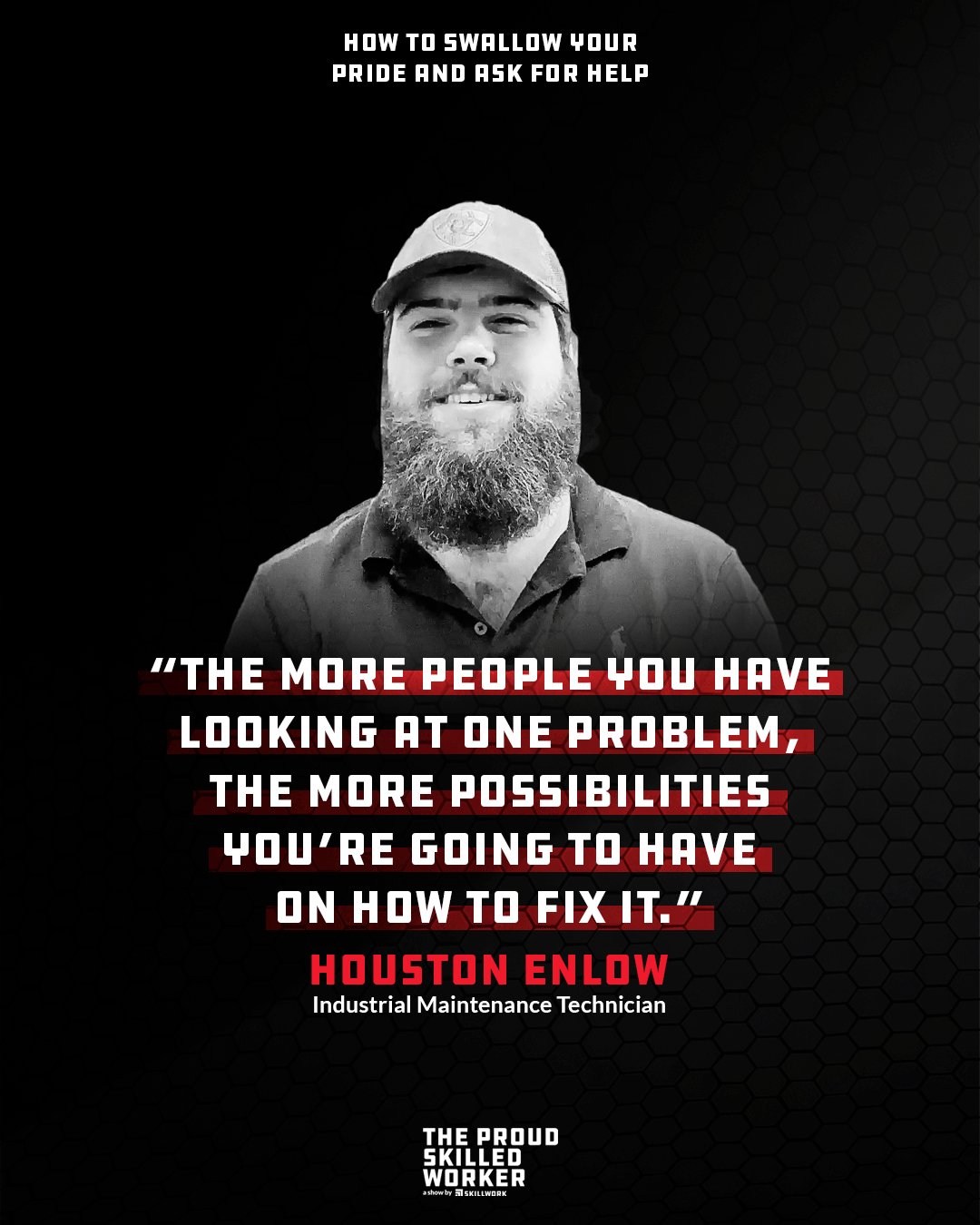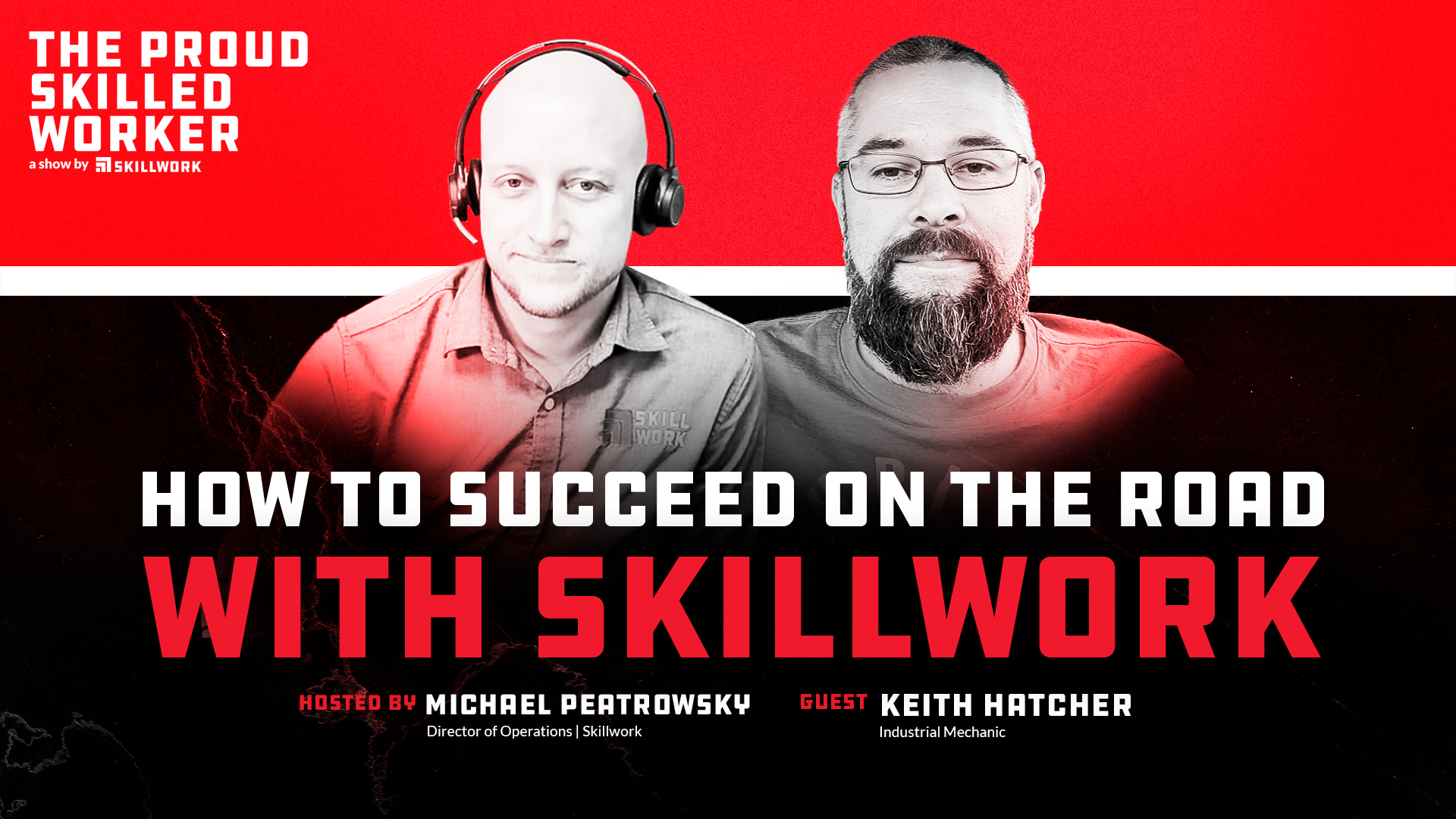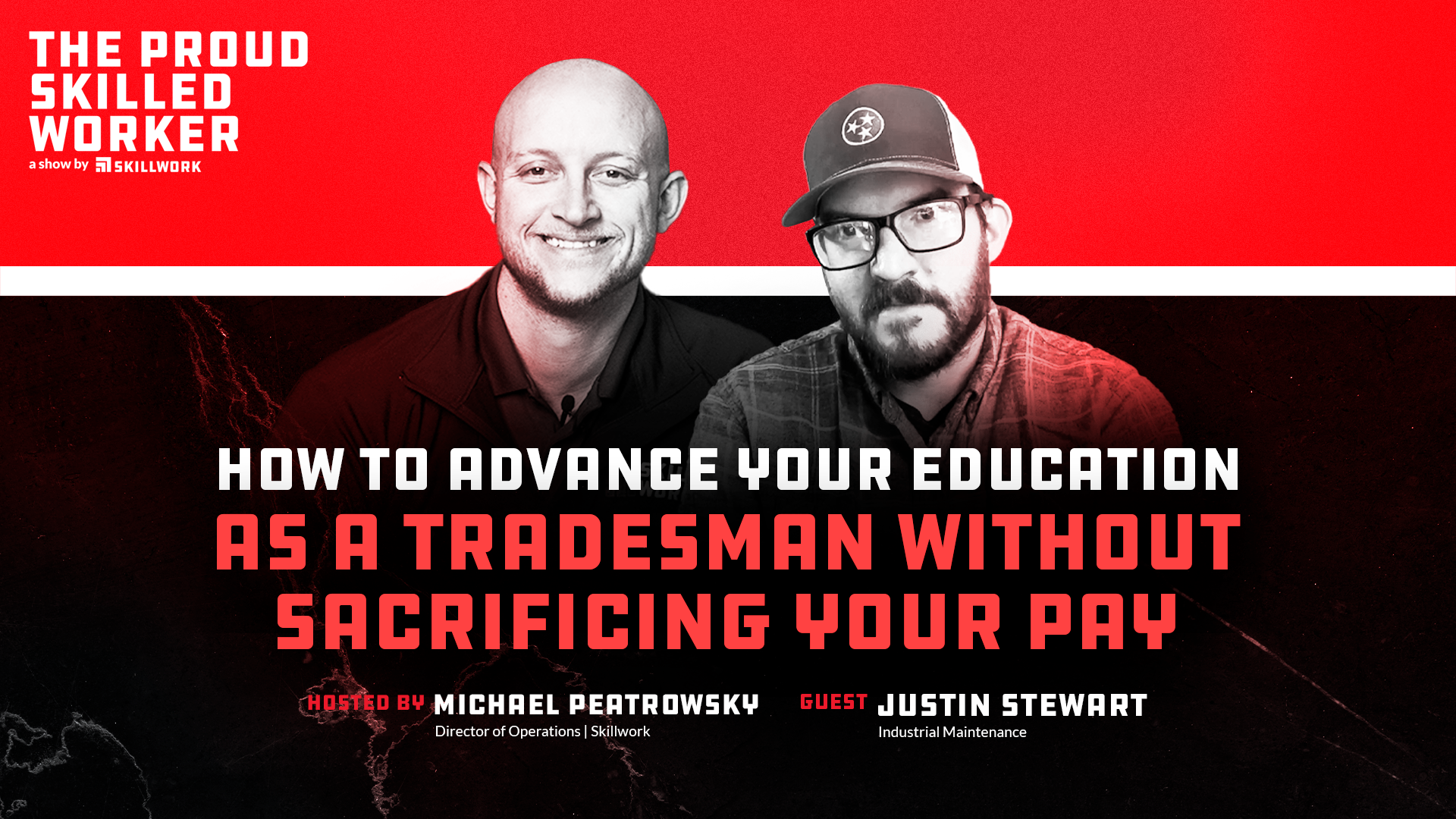How to Swallow Your Pride and Ask for Help - with Houston Enlow
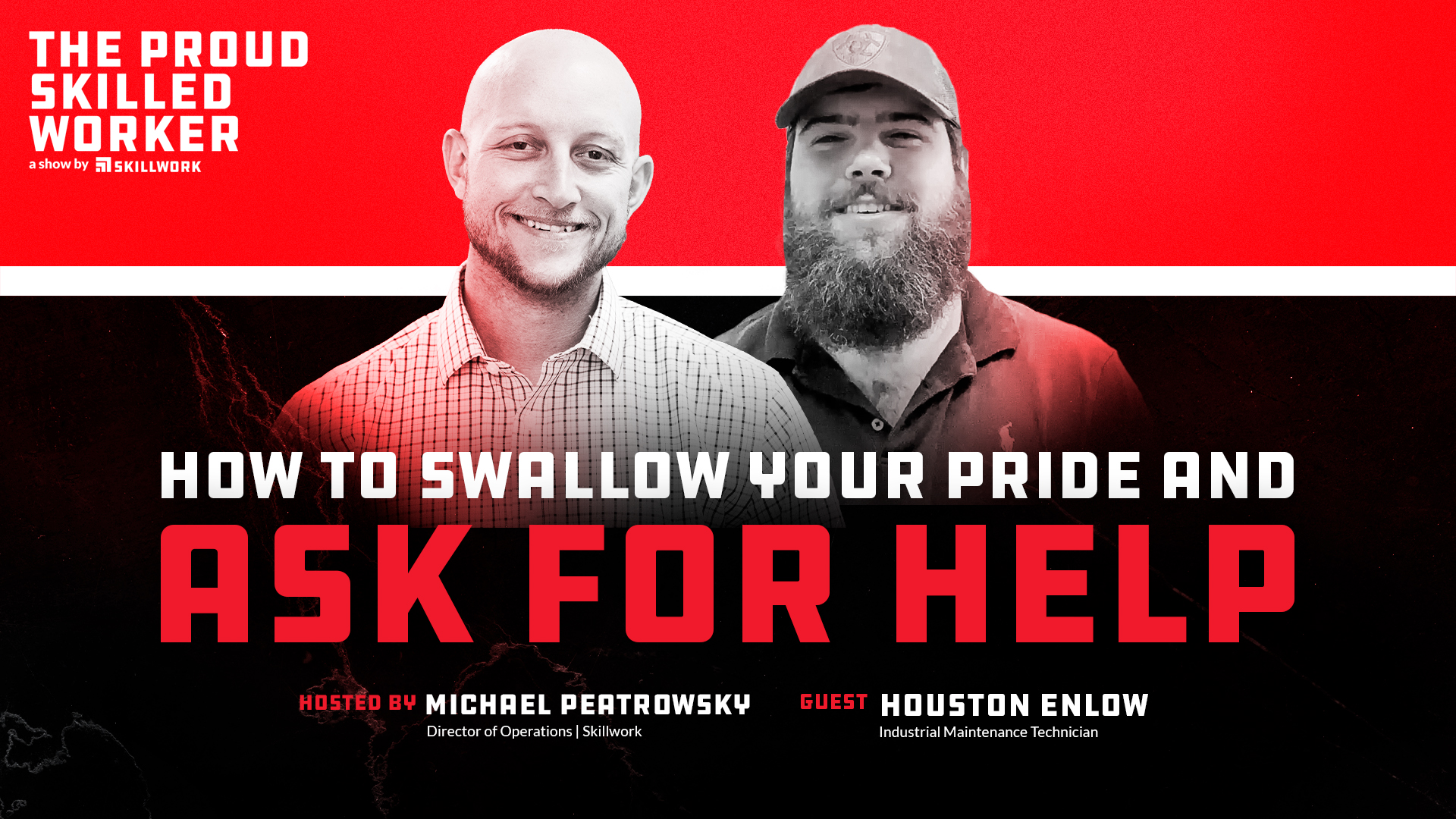
- Skillwork’s website: www.skillwork.com
- Skillwork’s LinkedIn: www.linkedin.com/company/skillwork
- Skillwork’s YouTube channel: www.youtube.com/channel/UCWZSf9KTuKudIm2buVFrhcw
- Rveal’s website: rveal.media
- Rveal’s LinkedIn: https://www.linkedin.com/company/rvealmedia/
- Rveal’s YouTube channel: https://www.youtube.com/channel/UC69p14R2ccMdyUbbmdlWCEw
Full Transcription:
“The following text was generated using a transcription service and may contain erros.”
Michael Peatrowsky 00:13
Hello, everybody and welcome to another episode of The proud skill worker today we had the opportunity to interview Houston and Lo. He's a maintenance mechanic in Mylan, Tennessee, just outside of humble about halfway between Nashville and Memphis, Houston. Thanks so much for being on the show
Houston Enlow 00:26
today. honorably here.
Michael Peatrowsky 00:28
So first off, I'd like to kick these stories off by just asking you how'd you get into trades? Tell me your story. Tell me about about how you got into fixing stuff with your hands and making broke things work?
Houston Enlow 00:38
Well, I grew up in a little small town in Mississippi. And we had a little bit of a farm and my dad always grew up working on plays between tractors, equipments, anything you think we just worked on fixed, run. And I remember throughout high school and college nearly ever No, I wanted to do I didn't want to have a desk job really I want so I can do work on my hands and being out there and just being active middle school, I went to ICC it was a community college I had a little program to get into those germaneness. S program and got into Georgia. I've been doing it ever since.
Michael Peatrowsky 01:12
That's great. What is what's been your biggest challenge in the trades or in your career paths? So far? You said
Houston Enlow 01:18
most definitely the best sounds for me has been trying to learn electrical work. For some reason, I never have been the best at that. I'm pretty good because mechanical things in that field. But electrical work, I just never have gotten a can get a good grip on it. None of what it is by
Michael Peatrowsky 01:33
how much exposure Have you had to that? I mean, have you avoided it? Or have you kind of run into that headstrong or
Houston Enlow 01:39
to deal with every day? I still work with I still do it. I just know, I had to ask a lot more questions come down to electrical work. And that's not my style. So I keep trying to push myself to work with things that are more logical that comes down to with
Michael Peatrowsky 01:54
us. You talked a little bit about a school you went to and then high school and into college. And then through ICC there. Talk to me about what it was like, you know, going through high school most likely had some trades and shop classes, maybe Manimals. And then you got into college. How did you end up stumbling into the ICC program? Where did you go to school in for maintenance? Or did you just come across a good program you wanted to be a part
Houston Enlow 02:16
of oh, so I just was sitting there in the recruiting office today trying to figure out what kind of degree are we wanting to get to you got blue shirt what I wanted to do, we're talking about stuff so hey, you know, it was an internship through through Toyota at the power factory plant not just too far from where I live. So hey, they're looking for maintenance guys, you do a two year internship, bam, you go to class twice a week, you work three days a week, go out there. And it's just you had four classes on day got a 10 to 20 Ever, ever wide range and maintenance work had to do for electrical, mechanical and robotics. And you go out there to work, you pretty much just work on the same thing you cover in class is not a very good program on Georgia or better. You got to actually be out in the field doing your job you're trying to learn about the classroom talk more in depth about what you actually do. So I thought was very neat and
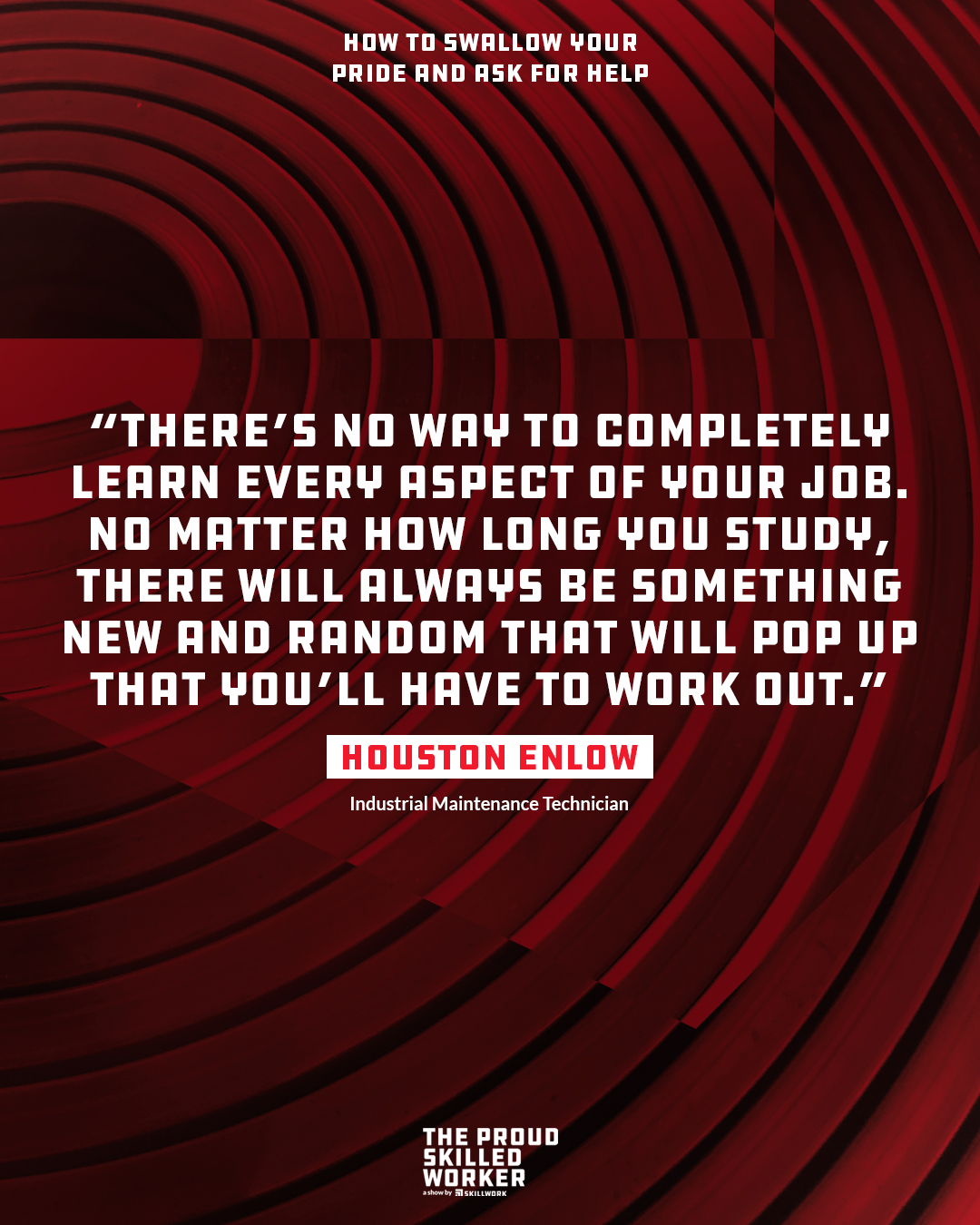
Michael Peatrowsky 03:07
super interesting. I know that here's go work we're trying to develop a an upskilling program or like a skill workout program, where we can send people to five to 10 day 40 hour ADR crash courses. I'm curious to know how long was the ICC course
Houston Enlow 03:20
on the one I did was a a two year program two years, okay. You had a course your your four semesters and then you would work through the summer. You weren't you weren't during during your four semesters course you also keep working during the summer even though you were off school. It was just
Michael Peatrowsky 03:38
so by the time you received your certificate or your degree, and I'm gonna get into that in a second. By the time you received that degree. You had gotten a degree been paid for two years and had two years of experience simultaneously Yes, that's correct. Man can't beat that can you
Houston Enlow 03:56
amazing program to get into and they even have some not through internships with three out of the house being go there and do this work. You don't want to an internship you gotta gotta get one now some other random factories throughout the state and just thought oh, this is a very good program to get into Georgia. I know a lot of us
Michael Peatrowsky 04:15
go to talk to me a little bit about after that program after those two years. What type of cert certification did you have? What type of degree do you hold? I mean, what is your actual like paper background right now like your physical certification background?
Houston Enlow 04:29
Well, the actual degree, my actual degree I got my graduate of college I believe was a I read what it actually was called. It was a degree in science as some degree science. Okay, yeah. Well, throughout the time I was a Toyota I guess I am certified and trying to put a lot of their things through robotics PLC, some electrical and a bunch of of their specific things through their factory I got a lot of training certifications.
Michael Peatrowsky 05:00
So what do you think right now is your next trade like your next certification? Or the next thing you're going to pursue? I know you mentioned electricals a little harder for you. But like right now, what are you actively doing certification wise to build your your career and to build your future,
Houston Enlow 05:14
um, I would love to clean this contract here. And I'd love to see if I get some training might even get into the ammonia field. So I'm always interested, I got some buddies of doing that, and they all seem to enjoy my life seemed like a hobby, and then everything was well and see as to how that line of work plays out.
Michael Peatrowsky 05:31
I think that's a natural next step for a lot of guys, if they're in maintenance, and then they either want to get into that there's kind of two routes, you either go high and electrical, get into PLCs and automation in that world, or you tend to drift into that boiler, utilities operation side of things. So I'm just gonna is curious to hear like, what's the next career step for you. Because as the world is changing, and technology and definitely in the industry, we're seeing more and more specialists and less and less jack of all trades. So talk to me a little bit about whether you think there's value in being a specialist in one industry or in one program, or in kind of knowing a lot about everything or a little better,
Houston Enlow 06:07
I think we're just being your overall maintenance technician, it better to be a jack of all trades, because you typically run into more of a little bit of everything, my acid and last marriage working on it, I've not run into you more electrical and more mechanical, I've run into a bunch of just all the concubine into one thing, some of the guys out there, they're extremely smart with with mechanical, they lag behind some in electrical issues, vice versa. So I feel like being more well rounded in both fields, helps you out better in the long run, and maybe a specialist in the one. I feel like you're you're allowed to conquer more problems and come across and help out better.
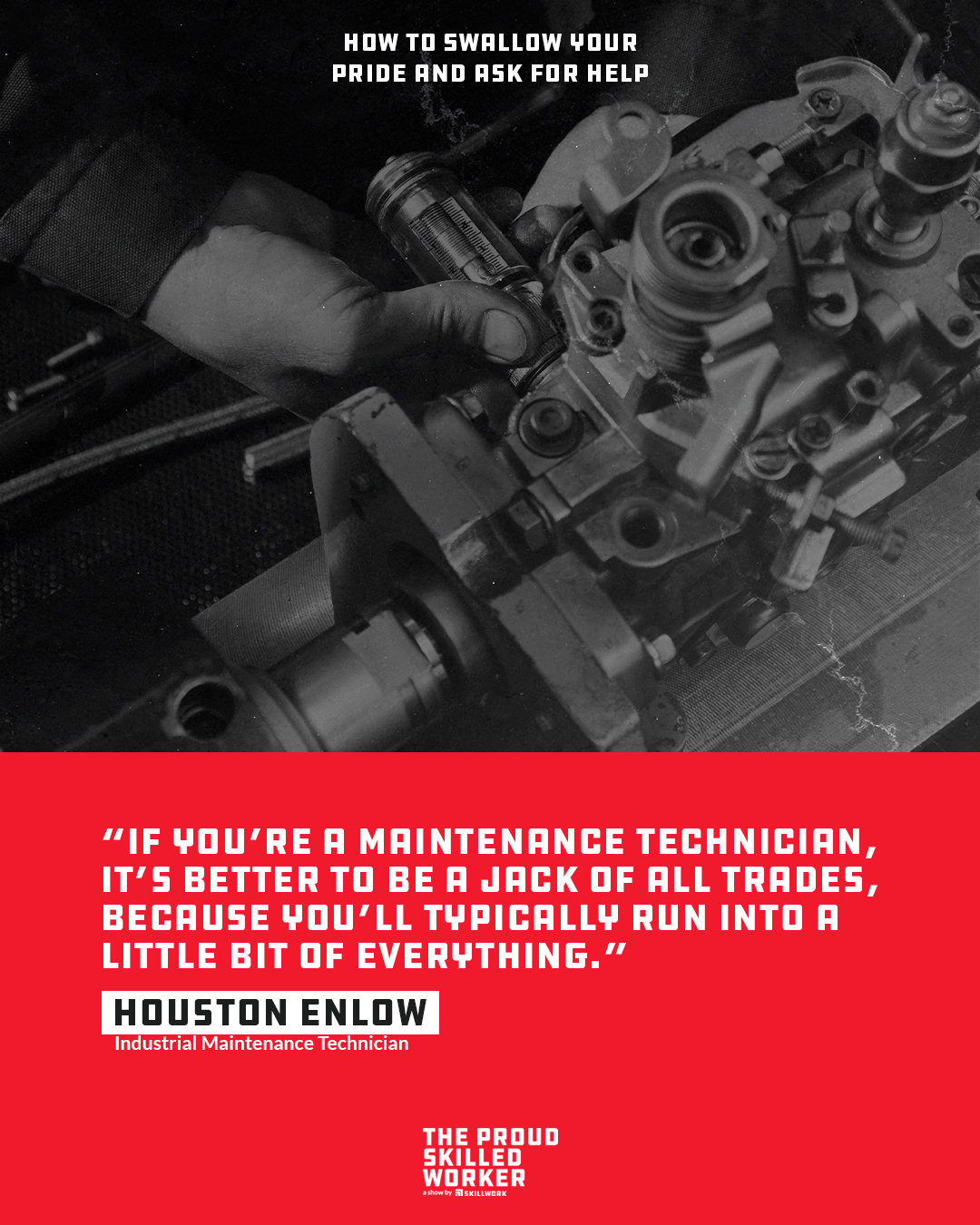
Michael Peatrowsky 06:44
All right, on that note with with some people, you know, the better mechanically better, electrically. Talk to me about how you feel in the world of like small maintenance teams versus bigger maintenance teams maybe like I've seen a lot of maintenance departments go into that buddy program where hey, you got two guys who basically work on every job together because one of them stronger electrical, one of them stronger mechanical, and they've actually found an increase rate. What are your thoughts behind behind that thought process and a maintenance team?
Houston Enlow 07:09
I think it's a great I think it's a great idea, man, it's you got your two guys both can help the other one, that was a problem that they can't fix that's always extremely well, sort of you have the more paper you have the looking at one problem, the more possible answers you're gonna get how to fix it, you have one guy that's really really mechanical one guy that's really really good electrical, and that can come together and work on the same thing. It's also what they're gonna see, you're gonna help on one problem you have Dan is if I say the mechanical guy's sick one day, he's gonna be out for the marriage left with your one logical guy trying to fix everything. mechanicals? Well, you're gonna be he's gonna be struggling more than she was. Yeah.
Michael Peatrowsky 07:48
You think that problem would dissipate over time, though. I mean, just inherently. If you're constantly watching someone like your partner, your your your buddy maintenance guy. If you're constantly watching him fix electrical problems, you're gonna learn something, right? I mean, over the course of two, three years, you probably pick up enough that maybe you actually bolster the maintenance team by going, You know what, I actually know how to fix this. We've done it a couple times before?
Houston Enlow 08:09
Yes, it does. 100% correct me the more you want somebody to work with them on something you don't know, the more you're going to learn how to do. I've learned a lot more watching people work on electrical than I did, trying to rip them on and started things like but I learned a lot by watching them the shadow and what they did getting them to explain to me how to do that. So there is a lot to be learned by watching people that you've worked with asking questions.
Michael Peatrowsky 08:32
I'm curious to know, he said when planning your career in the trades and the environment you're in, what are some things that you think everybody should know? I know that you sat in a recruiter's office and just kind of fell into a course that's not everybody's going to have that opportunity. What are some things that you would encourage people to be looking at as they they lean towards a career in the trades? What do people need to know
Houston Enlow 08:52
there was no way to completely learn your job probably gonna be something new, that's gonna happen. So you may study for three or four years exactly how to fix that machine. There may always be something random pop up, you have no workout. There's gonna be a lot of days that are a whole lot worse and other days, some days you might have some great day to day downtown with the minimal we had got the launch to get have a good time with Sunday, you're out there for eight to 12 hours just non stop. So you're gonna be you go you are you dude, walk in the doors, focus on one thing and walk out at night. What happened to me, Lord have mercy, man,
Michael Peatrowsky 09:28
it's just I think I think you said something there that catches me and surprises me that more people don't have that mindset is just focused on one thing. I do think at times in the world and even in the industry, people get distracted by focusing on more than one thing at a time. And in reality, you can only do the one task ahead of you. I think that's something I've seen. I'm curious to know is that something that's that's prevalent on the maintenance floor that people are more focused on? Well, we got 15 things to do today. What do we do or is it typically we have to do this thing first and this thing second, this things that are talked to me Where does that where does that fall for you? Do you think people are more scatterbrained or more direct right now?
Houston Enlow 10:04
It really depends on the project you got going on this a bunch of bunch of smaller simple things you can kind of go out there I'm gonna knock out that one, it delta delta t and we're done with that for the day some fives so that's gonna be a really big problem I need to focus harder so I don't mind if we get to the others that we get if we don't be okay there it really depends on what's going on and just how much help you have with my time yeah available to work on things get it all figured out.
Michael Peatrowsky 10:32
Why is that he sent you Why do you think people don't want to help that enter? Do you think it's because they're scared they're change their training their replacement? Or do you think it's something else?
Houston Enlow 10:39
I think a lot of it has to do with with the people you ask because typically the one that never wanted to help me and wanted to help me learn, definitely want to do anything. They want to just kind of sit back and do their job go home. So it's a work in terms of all the foods that I worked with came through the same program that I did, they just stick around Hey, hey, here's how they treated me so I'm gonna treat you it's coming by Thank you Miss busted your butt now figured out? Yeah, I could sit there a five minute class reading reading books, and perhaps I want to learn more go out there and working on for an hour. And I would the books
Michael Peatrowsky 11:14
learn. So it's less about not wanting to train and more about not wanting to do quote unquote, anything or keeping the status quo how they were treated
Houston Enlow 11:23
poorly. It really depends. A mixture of both is depending on who you're talking to. You're working
Michael Peatrowsky 11:27
there with one of a probably one of my five top five favorite skill workers because I've had just a lot of interactions with them. You're working there with Jeff Robertson, right?
Houston Enlow 11:36
Yes, sir. I love that man. He's a great dude.
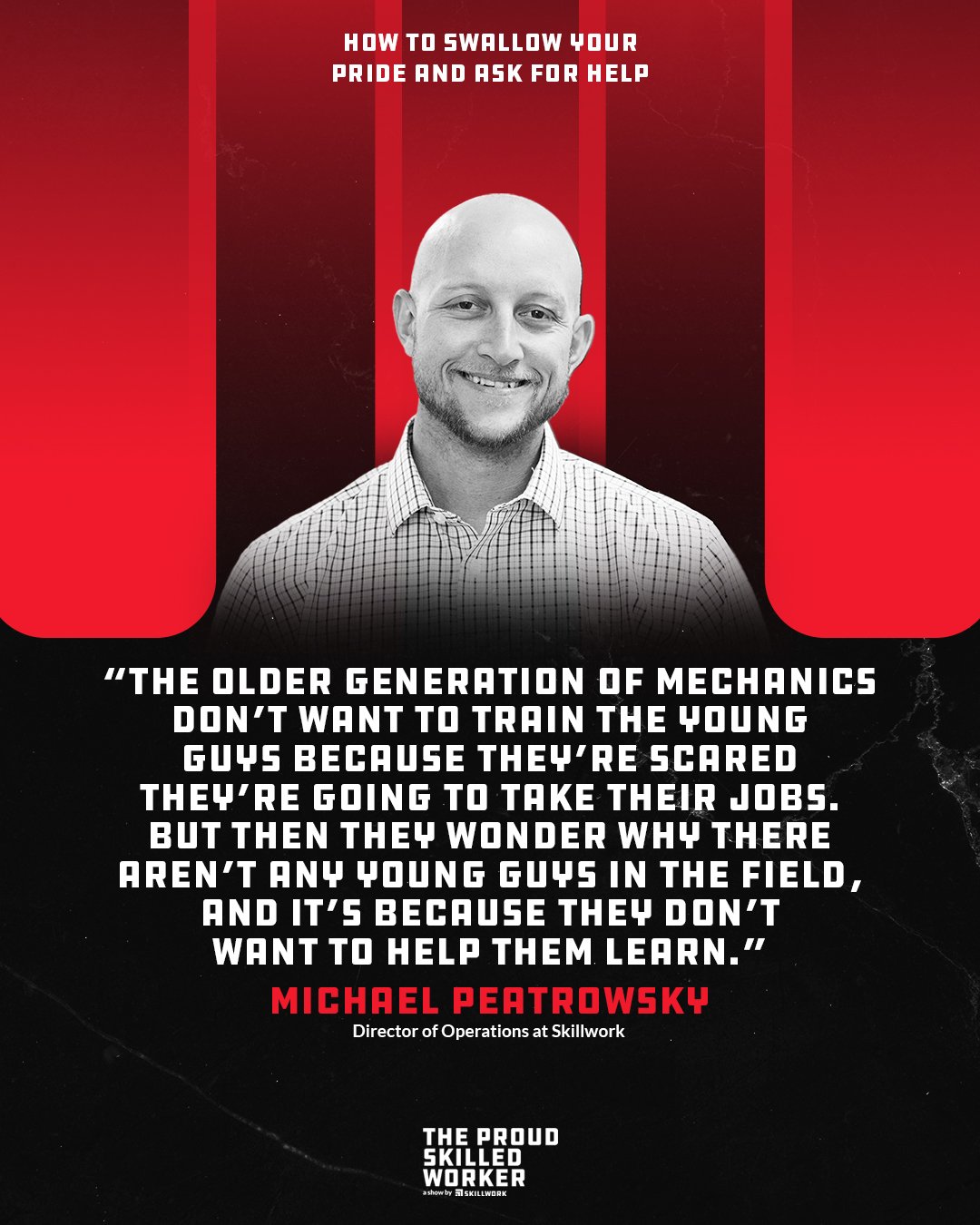
Michael Peatrowsky 11:39
His story is so cool and him coming on the podcast with us last month and just being willing to tell that and be real I think that that ties in a little bit to what you're talking about is being real and in your skin and being willing to look at people and go hey, you struggle in this let me help you because I struggle here and you gotta help me. I think that's so the the industry kind of shied away from admitting where we struggle and it's not just that's just the maintenance industry it's everybody as a hole right now is so counter to say hey, I'm struggling will someone help me because I'll help them
Houston Enlow 12:11
nobody wants to admit that they aren't the best right? Oh my hurt your pride more anything else Asheville but all your pride Nashville for things I've had to ask help with some of the stupidest simplest thing but if you don't know you don't know. That's just how it is right end of the day is better to ask questions about it and then end up possibly getting yourself or making a bigger problem than you started with.
Michael Peatrowsky 12:34
That's right, here's and this isn't a show where I open the floor to you. I'm going to put you on a pedestal and I want you to just say whatever it is that you want to say to the industry as a whole what's one thing you wish every single every single technician every single mechanic everybody who's in the trades could hear what is the question
Houston Enlow 12:51
after going through my internship a lot of the people that I began to work with nobody wanted to help teach them there was cars still stick them in the corners Hey, you forgot you leave me alone the now but this past few Giada has been 100% in different experience with everybody has been more than willing to help answer any questions you have teaching anything you want to know that was probably that was the biggest aggravation for me getting started into this field was being entertained God that man you're 18 years old have no put you down I'm really come down to industrial industrial equipment like that. Trying to ask questions people out you know what, leave me alone doing my job go have like not not really anymore teaching. And not everybody's like that mean, there was a good half and half says My biggest thing, you have people that are trying and willing to want to learn how to do something, teach them a lot of that. See that is you know, he's gonna be trying to be my replacement one day he got from my job, which we're trying to learn how to do your job so we can be functional part of a team, not just stuck on or reading a book all they talk to them about what's going on with their boy I've worked with recently has been just more than help on answering the questions I have
Michael Peatrowsky 14:02
to catch 22 from that, from that older generation of mechanics, and this has always kind of been the thing. It's not just that right now. It's not the era we live in as well. I don't want to train the young guy, he's gonna take my job. And then on the backside of that, the older mechanics are always well, why is there no young people in the industry? Well, because you won't help them learn. Because you're scared they're gonna take your job. That's exactly right. That's great. Anything else Houston that you think you'd like to say? Anything that you want to circle back to that you thought of as as we've talked through the rest of this?
Houston Enlow 14:31
I can't I can't think of anything at the moment right now.
Michael Peatrowsky 14:34
Thank you so much, Houston for being on the show. And everybody who's watching thank you so much for your support. Continue to watch episodes of The proud skill workers they come out. We put episodes out every two weeks. Subscribe to the YouTube channel. You can follow us anywhere that you get your podcasts. Thanks so much, everybody.
